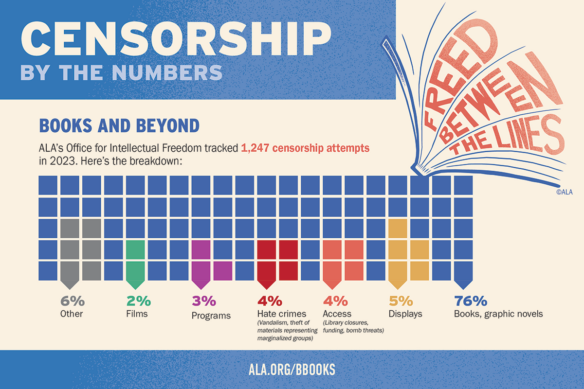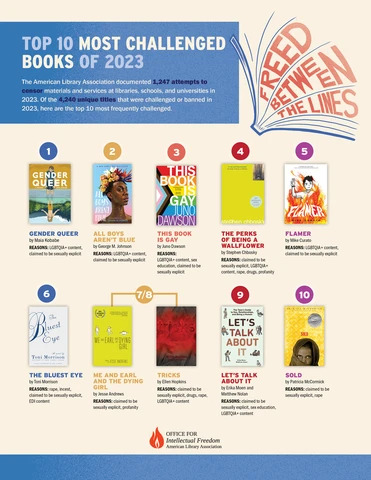
Banned Books Week runs September 22-28.
Among the highlights of Banned Books Week, a day of action is planned for September 28—Let Freedom Read Day—on which everyone is encouraged to “do at least one thing on September 28 to fight censorship.”
The American Library Association has released preliminary data documenting attempts to censor books and materials in public, school, and academic libraries during the first eight months of 2024. “American Library Association reveals preliminary data on 2024 book challenges” at ALA.
Between January 1 and August 31, 2024, ALA’s Office for Intellectual Freedom tracked 414 attempts to censor library materials and services. In those cases, 1,128 unique titles were challenged. In the same reporting period last year, ALA tracked 695 attempts with 1,915 unique titles challenged. Though the number of reports to date has declined in 2024, the number of documented attempts to censor books continues to far exceed the numbers prior to 2020. Additionally, instances of soft censorship, where books are purchased but placed in restricted areas, not used in library displays, or otherwise hidden or kept off limits due to fear of challenges illustrate the impact of organized censorship campaigns on students’ and readers’ freedom to read. In some circumstances, books have been preemptively excluded from library collections, taken off the shelves before they are banned, or not purchased for library collections in the first place.
The ALA says the reduced number of attempts likely reflects the success of advocacy efforts—including efforts by individual librarians, key wins in several lawsuits, and broad anti-censorship programs such as ALA’s Unite Against Book Bans.






The Top 10 Most Challenged Books of 2023 are:
Sold by Patricia McCormick
Reasons: Claimed to be sexually explicit, depiction of rape
Gender Queer by Maia Kobabe
Reasons: LGBTQIA+ content, claimed to be sexually explicit
All Boys Aren’t Blue by George M. Johnson
Reasons: LGBTQIA+ content, claimed to be sexually explicit
This Book is Gay by Juno Dawson
Reasons: LGBTQIA+ content, sex education, claimed to be sexually explicit
The Perks of Being a Wallflower by Stephen Chbosky
Reasons: Claimed to be sexually explicit, LGBTQIA+ content, rape, drugs, profanity
Flamer by Mike Curato
Reasons: LGBTQIA+ content, claimed to be sexually explicit
The Bluest Eye by Toni Morrison
Reasons: Depiction of rape, incest, claimed to be sexually explicit, EDI content
(TIE) Tricks by Ellen Hopkins
Reasons: Claimed to be sexually explicit, drugs, depiction of rape, LGBTQIA+ content
(TIE) Me and Earl and the Dying Girl by Jesse Andrews
Reasons: Claimed to be sexually explicit, profanity
Let’s Talk About It by Erika Moen and Matthew Nolan
Reasons: Claimed to be sexually explicit, sex education, LGBTQIA+ content
Discover more from File 770
Subscribe to get the latest posts sent to your email.

The group that is trying and succeeding in some cases to have books removed from public and school libraries is actually small. I loved what one woman said. “I did not ask you to co-parent my children.
Hasn’t The Perks of Being a Wallflower been a regular entry on this list for like the last 20 years? I also recall the content being rather on the intense side in general (even if one of the tamer sections was a regular selection for forensics competitions as I recall); I’d put that in a bucket of novels that are /probably/ alright at the high school level but which might occasionally slip into a middle school library (where it might be a bit much) and where things get jumbled if you have shared libraries or non-standard grade divisions.
Of course, this also reminds me of the ALA’s “Banned Books list” in the 1990s containing, among other entrants, The Anarchist’s Cookbook and Final Exit, and how the ALA was probably lucky that those never made their top ten lists…
#1, #3, #5, and #9 are either outright porn or porn adjacent and have no business being in a public elementary school or middle school library.
All four books are available via Amazon and many other retail establishments. Anyone can purchase them without fear of being arrested. The publishers aren’t under threat of being arrested. The authors aren’t under threat of being arrested.
The books are not banned in any meaningful sense of the word.
What is going on is a discussion about age-appropriate content and the priorities for public spending on library resources.
Regards,
Dann
Words are, of course, the most powerful drug used by mankind. – Rudyard Kipling
Dann665: You’re absolutely right. Big government is our friend and the fact that you agree with some of its decisions means it’s trustworthy in all things. The most reassuring words in the English language are “I’m from the government and I know better than you about what your child needs”
This essay tells the story of how J. Michael Straczynski got the Bible removed from a local school library, by the sneaky method of reading it aloud at a school board meeting. Surprisingly, although the Bible was in no sense banned, hundreds of people considered this removal to be outrageous, and demanded that the school return the Bible to the shelves.
Some mothers in Utah went to a school board meeting and demanded that a book be removed. The board asked why. The mothers described the content of the book and the board was appropriately shocked that such a book should be in school libraries and agreed that it needed to be removed. Then they asked what book it was.
You guessed it. The Bible.
But the school board did, after due consideration, conditionally remove and restrict it, particularly from being available to younger readers.
I can’t give your particulars. I don’t make notes on everything that I read, either on the net on in hard copy. But I imagine the Folks in the File have the skills to find it.
I am astonished to see the date the robot has appended to this post. I know that I am ahead of my time, but really, September 15, 2938?
Looks like the robot has corrected that date.
@Andrew (not Werdna)
Thanks for the link. I’m glad there are people in the world like that.
It is a bit of an apples/oranges situation. He was reacting to the tactic of using a small section of a much larger work out of context to justify removal. He was using that tactic himself.
The five works I keep referencing are objectionable for children in the totality of those works and not due to a minute excerpt.
I remain opposed to attempts to sexualize children. I also remain opposed to putting things like The Turner Diaries in public school libraries. Given the finite resources involved, proper discretion would opt for works with actual literary and social value.
Regards,
Dann
When I became a man I put away childish things, including the fear of childishness and the desire to be very grown up. – C.S. Lewis